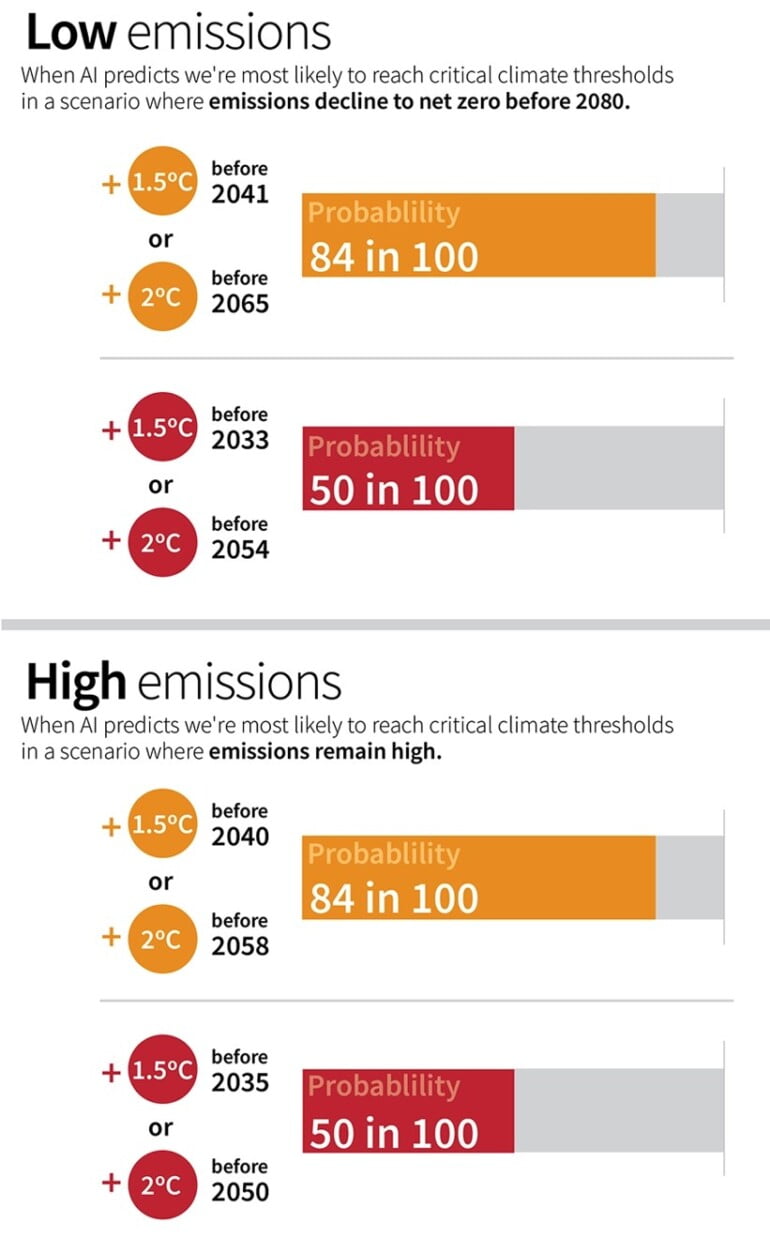Climatologists make drastic climate change predictions using AI

Key Points
- A Stanford University study predicts that average global temperatures will exceed two degrees by mid-century, even if global climate pollution is significantly reduced.
- The study used an AI system trained on current climate model simulations and historical temperature data. The model correctly predicted past global warming.
- The more ambitious climate targets set by some nations to achieve net-zero emissions between 2050 and 2070 are designed to meet the 1.5 degree goal, but are likely necessary to meet the two degree threshold.
A Stanford University study estimates that the Earth will warm by 1.5 degrees Celsius above pre-industrial levels within a decade. The study is based on predictions from an artificial intelligence model.
A new Stanford study has found a "substantial possibility" that global temperature rise will exceed two degrees by mid-century - even if global climate pollution is significantly reduced.
The study was published Jan. 30 in the Proceedings of the National Academy of Sciences. It was led by Stanford University climate scientist Noah Diffenbaugh, along with Colorado State University atmospheric scientist Elizabeth Barnes.
AI model accurately predicts historical climate change
For the new prediction, the researchers used an AI system trained on the results of current climate model simulations and fed with historical temperature measurements from around the world. The AI predicted the number of years it would take to reach a certain temperature threshold based on actual annual temperature anomalies over the reference period of 1951-1980.
To test the model, the researchers had it predict the current global warming of 1.1 degrees for each year between 1980 and 2021. The AI correctly predicted the level of warming for 2022, with a probability range of 2017 to 2027, and also considered the rate at which the number of years to reach 1.1 degrees has decreased in recent decades.
Diffenbaugh rates this as passing the "acid test." The researchers had been skeptical of their method before, he says, but accurately predicting the course of climate change so far has increased confidence in predicting future warming.
1.5-degree effort needed to reach two-degree threshold
The researchers examined three climate pathways that differ in the intensity of global warming caused by greenhouse gases. In all three scenarios, they arrived at a global average temperature 1.5 degrees higher in the early 2030s.
If emissions remain high over the next few decades, the AI predicts a one-in-two chance that Earth will become 2 degrees Celsius (3.6 Fahrenheit) hotter on average compared to pre-industrial times by the middle of this century, and a more than four-in-five chance of reaching that threshold by 2060.
Stanford News
Diffenbaugh said the AI model is very confident that the two-degree threshold will be exceeded if it takes another half century to reach net-zero emissions. Other projections, Diffenbaugh said, assume that the two-degree threshold can be met if net-zero emissions are achieved before 2080. His findings may prove controversial among scientists and policymakers, Diffenbaugh said.
Even if emissions fall rapidly to zero by 2076, the 2-degree limit would almost certainly be reached, according to the AI forecast. Under this scenario, the model predicts a 1 in 2 chance of reaching the 2-degree limit by 2054, and a 2 in 3 chance of exceeding it between 2044 and 2065.

The more ambitious climate goals of some countries, which aim for net-zero emissions between 2050 and 2070, are aimed at meeting the 1.5-degree goal, but are likely necessary to stay within the 2-degree threshold, Diffenbaugh said.
AI News Without the Hype – Curated by Humans
As a THE DECODER subscriber, you get ad-free reading, our weekly AI newsletter, the exclusive "AI Radar" Frontier Report 6× per year, access to comments, and our complete archive.
Subscribe now